With the release of C# 10 in November 2021 developers were introduced to a new concept called records, in this post I’ll outline some of the key differences between records and classes.
For this comparison I’ll only consider the default/common approach for creating class’ and records’, since a record is really just syntactic sugar on top of a class / struct the behavior is not isolated to records but by default they behave differently.
The record I’ll use for comparison is:
public record PointRecord(int X, int Y);
and the class is:
public class PointClass
{
public int X { get; set; }
public int Y { get; set; }
}
1. Mutability
Records are immutable because the properties are only settable when the record is created. A class can behave in a similar way if you use { get; init; } instead of { get; set; }
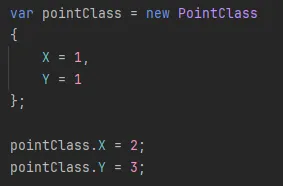
Properties of a class instance can be updated after its created.

Properties can’t be updated and will result in a compile time error.
Records also support Nondestructive mutation which means that a record can be cloned and properties can be changed using the object initialize syntax for example:
var point1 = new PointRecord(1, 2);
var point2 = point1 with { X = 2 };
This would be equivalent creating a new record with X = 2 and Y = 2 as the value for Y is copied from point1.
2. Equality
Class equality is by reference and record equality is by value. This means that if two point classes are created with the same properties they will not be equal because they have different references.
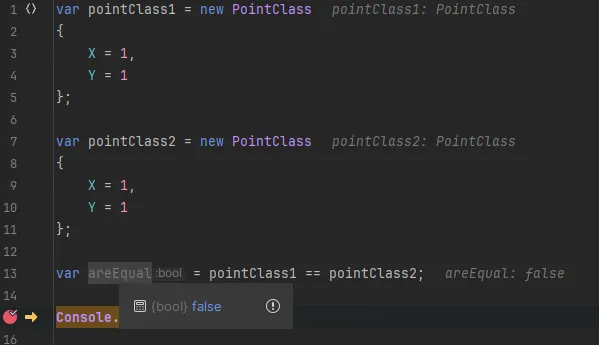
If we test the same behavior with records we’ll find that they’ll be equal.

You can easily override the equality behavior of a class to be value based by overriding the equals method.
3. Deconstruction
Deconstruction is a process of splitting a variable value into parts and storing them into new variables. This could be useful when a variable stores multiple values such as a tuple.
For example consider enumerating a list of point classes.
var points = new List<PointClass>();
foreach (var point in points)
{
var z = point.X * point.Y;
}
The only way to access the properties X and Y is via the point instance. For records this can be simplified using deconstruction.
var points = new List<PointRecord>();
foreach (var (x, y) in points)
{
var z = x * y;
}
A class can easily support deconstruction by adding a method named Deconstruct:
public class PointClass
{
public int X { get; set; }
public int Y { get; set; }
public void Deconstruct(out int x, out int y)
{
x = this.X;
y = this.Y;
}
}
4. ToString()
ToString() on a class will return the class name unless overridden.
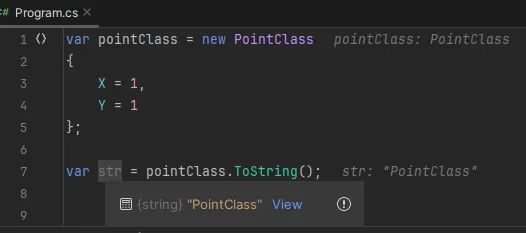
ToString() is overridden in records to print the class name as well as its properties. This is helpful for debugging as the values are easily visualized.

5. GetHashCode()
Hash codes for reference types are computed by calling the Object.GetHashCode method of the base class, which computes a hash code based on an object’s reference if not overridden. For records the has code is based on the value of its properties. This means that two class instances with the same properties will have different hash codes and two records with the same values will have the same hash code.
Class
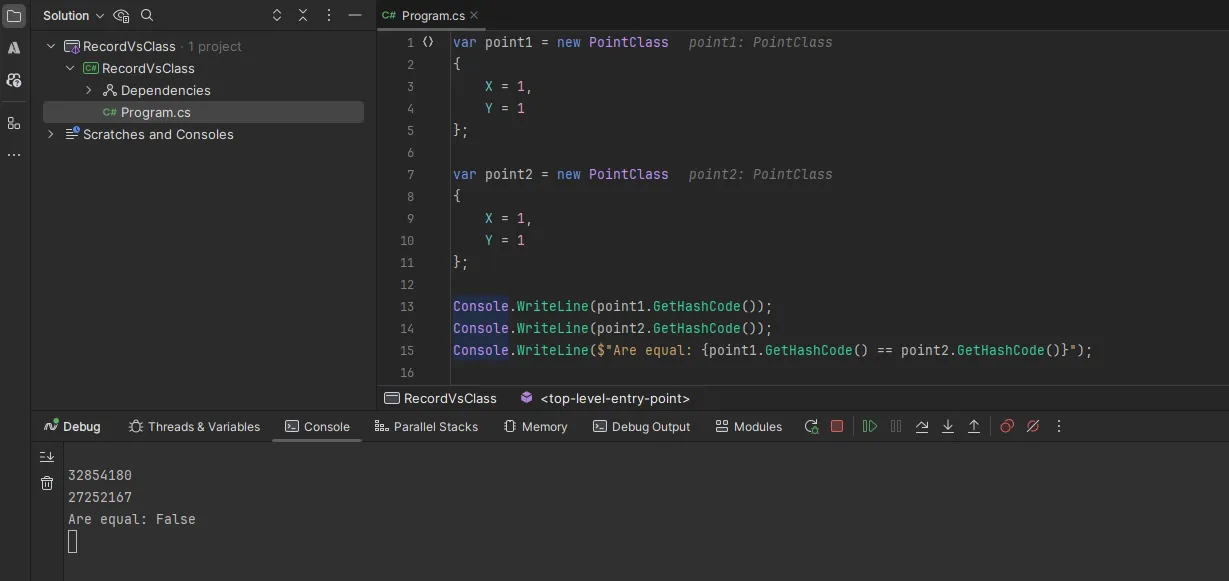
Record
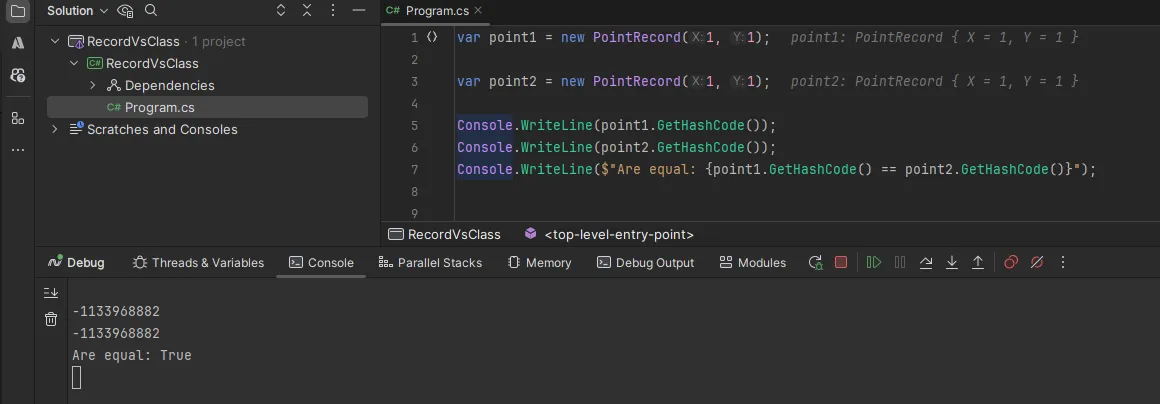
Lowered C# of a record
Records are really just syntactic sugar on a class which is generated at compile time. Below is the lowered C# of the point record which shows the implementation details and explains why record classes behave differently from classes. The key overridden methods are:
- public override string ToString()
- public override int GetHashCode()
- public override bool Equals(object obj)
using System;
using System.Collections.Generic;
using System.Diagnostics;
using System.Runtime.CompilerServices;
using System.Text;
[NullableContext(1)]
[Nullable(0)]
public class PointRecord :
/*[Nullable(0)]*/
IEquatable<PointRecord>
{
[CompilerGenerated]
[DebuggerBrowsable(DebuggerBrowsableState.Never)]
private int <X>k__BackingField;
[CompilerGenerated]
[DebuggerBrowsable(DebuggerBrowsableState.Never)]
private int <Y>k__BackingField;
[CompilerGenerated]
protected virtual Type EqualityContract
{
[CompilerGenerated] get
{
return typeof (PointRecord);
}
}
public int X
{
[CompilerGenerated] get
{
return this.<X>k__BackingField;
}
[CompilerGenerated] set
{
this.<X>k__BackingField = value;
}
}
public int Y
{
[CompilerGenerated] get
{
return this.<Y>k__BackingField;
}
[CompilerGenerated] set
{
this.<Y>k__BackingField = value;
}
}
[CompilerGenerated]
public override string ToString()
{
StringBuilder builder = new StringBuilder();
builder.Append("PointRecord");
builder.Append(" { ");
if (this.PrintMembers(builder))
builder.Append(' ');
builder.Append('}');
return builder.ToString();
}
[CompilerGenerated]
protected virtual bool PrintMembers(StringBuilder builder)
{
RuntimeHelpers.EnsureSufficientExecutionStack();
builder.Append("X = ");
builder.Append(this.X.ToString());
builder.Append(", Y = ");
builder.Append(this.Y.ToString());
return true;
}
[NullableContext(2)]
[CompilerGenerated]
[SpecialName]
public static bool op_Inequality(PointRecord left, PointRecord right)
{
return !PointRecord.op_Equality(left, right);
}
[NullableContext(2)]
[CompilerGenerated]
[SpecialName]
public static bool op_Equality(PointRecord left, PointRecord right)
{
if ((object) left == (object) right)
return true;
return (object) left != null && left.Equals(right);
}
[CompilerGenerated]
public override int GetHashCode()
{
return (EqualityComparer<Type>.Default.GetHashCode(this.EqualityContract) * -1521134295 + EqualityComparer<int>.Default.GetHashCode(this.<X>k__BackingField)) * -1521134295 + EqualityComparer<int>.Default.GetHashCode(this.<Y>k__BackingField);
}
[NullableContext(2)]
[CompilerGenerated]
public override bool Equals(object obj)
{
return this.Equals(obj as PointRecord);
}
[NullableContext(2)]
[CompilerGenerated]
public virtual bool Equals(PointRecord other)
{
if ((object) this == (object) other)
return true;
return (object) other != null && Type.op_Equality(this.EqualityContract, other.EqualityContract) && EqualityComparer<int>.Default.Equals(this.<X>k__BackingField, other.<X>k__BackingField) && EqualityComparer<int>.Default.Equals(this.<Y>k__BackingField, other.<Y>k__BackingField);
}
[CompilerGenerated]
public virtual PointRecord <Clone>$()
{
return new PointRecord(this);
}
[CompilerGenerated]
protected PointRecord(PointRecord original)
{
base..ctor();
this.<X>k__BackingField = original.<X>k__BackingField;
this.<Y>k__BackingField = original.<Y>k__BackingField;
}
public PointRecord()
{
base..ctor();
}
}